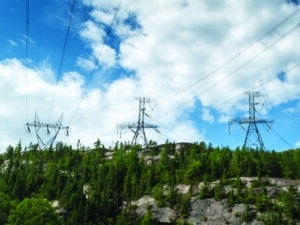
High-voltage power lines in Quebec. Boston building owners and investors are relying on the ability to import the Canadian province’s abundant and carbon-free hydroelectric power.
A referendum in Maine spells big trouble for both office building owners and developers in Boston as they scramble to meet the city’s tough, new carbon emissions rules.
An odd coalition of environmentalists, fossil fuel giants and ornery Mainers upset at the construction of a major transmission line across their state struck a potentially fatal blow on against plans to funnel Quebec hydropower to the electric grid in Massachusetts.
Voters across the Pine Street state voted by a lopsided 60 percent to 40 percent margin on Nov. 2 in favor of a referendum to stop the $1 billion transmission line already well under construction in the woods of Western Maine.
The developers of the transmission line are now looking to the courts in hopes of salvaging the project, but the vote at the very least will cause delays to a project is expected to play a crucial role as the Bay State scrambles to halve its carbon emissions by 2030.
And for Boston’s beleaguered commercial real estate industry, already reeling from empty offices, shops and restaurants in the wake of the pandemic, the vote in Maine could not have been worse news.
Boston recently passed tough new carbon reduction regulations taking aim at the city’s largest buildings, which are a major source of emissions.
The city’s new Building Energy Reporting and Disclosure Ordinance, or BERDO 2.0, would steadily ratchet down building emissions, with new and lower goals every five years until reaching net zero in 2050.
The real estate firms and investors who control the city’s office market face the prospect of expensive retrogrades to their properties in order to stay in compliance, an especially challenging task for owners of older office and commercial buildings dating to the early 20th or even late 19th centuries, and which have lower rents and thinner bottom lines and have been more likely to have empty space.
For building and tower owners alike, one way to soften the blow would be to enter into contracts to buy renewable power, which would serve essentially as bargaining chips – or renewable energy credits – that can be used to offset some emissions and more extensive retrofits.
Will Mayor Offer Reprieve?
But that could prove to be a tall order if clean power simply isn’t there to buy, with massive amounts of hydropower bottled up in Quebec and unable to reach the grid in Massachusetts.
“That is a huge amount of [clean] power off the grid. I don’t know where that comes from now,” said Greg Vasil, president and CEO of the Greater Boston Real Estate Board.
Worse yet, the Maine vote is unlikely to be a one-off, but rather a harbinger of trouble ahead, not just for Massachusetts and its decarbonization efforts, but for the country as a whole.
It’s one thing to ramp up hydropower production and to dot the landscape – and now seascape as well – with wind farms and solar installations.
But all that clean new power needs a way to get to homes and businesses across New England and across the country, and that will mean not just a few more transmission lines, but lots more.
For tower and building owners in Boston, a big question looms: Just how much slack will the new administration of Mayor Michelle Wu will cut them based on setbacks to decarbonization like the one in Maine that are beyond their control?
An answer to that will start to emerge in the coming months as city officials start to hammer out the rules needed to implement the new building emissions standards.
Stay tuned.
Scott Van Voorhis is Banker & Tradesman’s columnist; opinions expressed are his own. He may be reached at sbvanvoorhis@hotmail.com.





